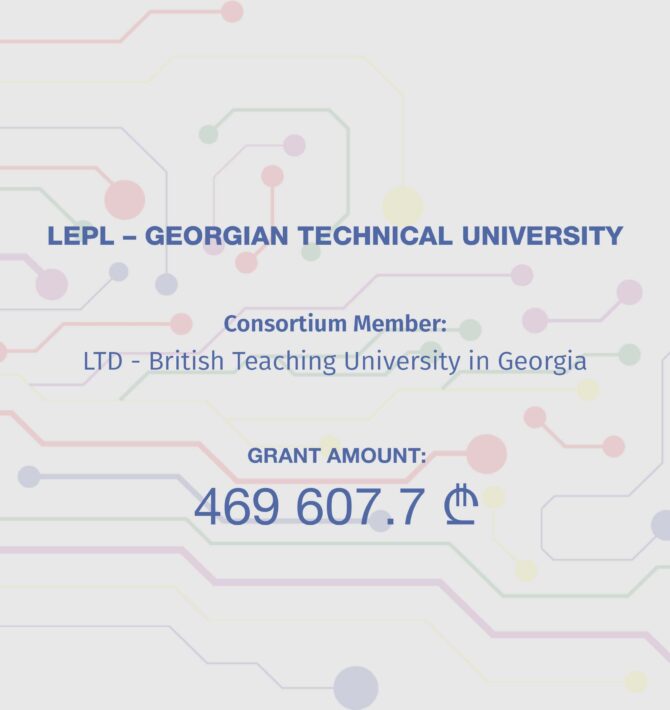CyberShield: Innovative ICT Education for a Secure Future
Beneficiaries: LEPL – Georgian Technical University and LTD – British Teaching University in Georgia
Project Name: CyberShield: Innovative ICT Education for a Secure Future
Implementation Dates: 06/2024 – 12/2025
Total Project Cost: 498,407.7 GEL
Grant Amount: 469,607.7 GEL
Description
The goal of the project is to create an innovative educational space at the highest level of education in accordance with the state security policy in Georgia, which will contribute to the creation of a secure future for the country by advancing cyber security challenges and the latest achievements. The importance of cyber security for Georgia includes national security, economic stability, critical infrastructure protection, data privacy, international relations, intellectual property, cyber security resilience, cyber crime prevention and education. A comprehensive and proactive approach to cyber security is vital to securing the country’s digital future and promoting sustainable development.
Activities
In order to effectively achieve the goal of the project, with the joint efforts of the universities, a new joint educational master’s program in cyber security will be developed. In the process of developing the program, the experience of similar programs of leading international universities will be taken into account, including “Adelphi University” (USA) – a partner of the British educational university in Georgia.
In frames of the project, together with the joint master’s program, a cyber security research and training laboratory will be created, which will be equipped with the latest equipment and will ensure the implementation of practical work of training courses in the program, high-quality, experiment-based research work of master’s students, planning of interesting current activities with the involvement of professors.
Trainings will be held on the basis of the cyber security laboratory for the development of cyber security field competencies of professors and for the improvement of cyber security teaching and knowledge transfer methods.
Involvement of companies in the relevant industry sector in the project as an employer will contribute to the employment of masters and graduates, solving the real research tasks of the company as necessary within the framework of the master’s research component, bringing the labor market closer to the universities.
In order to increase the tendency to overcome the actual gender and ethnic imbalance in the field, a series of workshops on cyber security issues will be held for female students from ethnic minorities.
Sustainability
The practices and specific results derived from the project’s implementation—such as creating a joint undergraduate educational program, establishing a laboratory, developing an innovative methodological framework for teaching, enhancing staff competencies, developing an accredited program, bridging the gap with the labor market, and making strides in gender equality—constitute the concrete components that will be integrated into the universities’ educational processes. Over time, these components will be reinforced through accumulated experience.
The equipment purchased for the project plays a crucial role in enabling practical aspects of the universities’ educational courses, facilitating research, and conducting experiments. Post-project measures will focus on the systematic updating of laboratory equipment and software. The potential for internal financing by the universities will be a key resource in this regard.
The partner universities will collaboratively implement the program developed within the project’s framework. Analyzing current labor market trends and involving employers in the program will create a dynamic cycle of continuous program updates, in collaboration with the universities’ quality assurance services.
Furthermore, the consortium is actively exploring options for external funding. The operation of a grants office at the lead university and proactive engagement of a consortium member with international partners are enhancing these possibilities.







